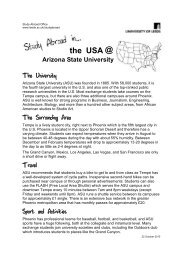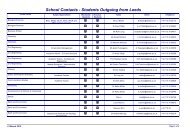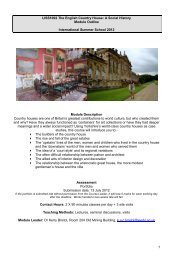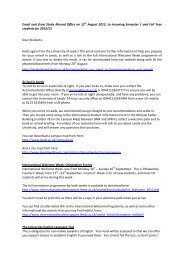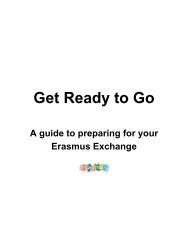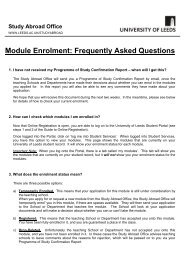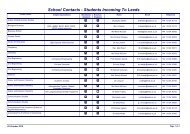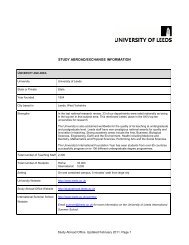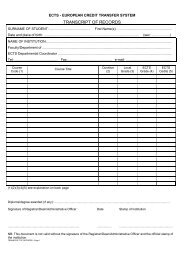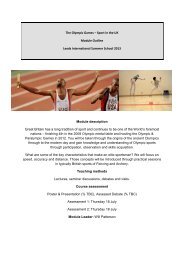British Literature and the Brontës - Study Abroad
British Literature and the Brontës - Study Abroad
British Literature and the Brontës - Study Abroad
You also want an ePaper? Increase the reach of your titles
YUMPU automatically turns print PDFs into web optimized ePapers that Google loves.
Kerry Powell, Oscar Wilde <strong>and</strong> <strong>the</strong> Theatre of <strong>the</strong> 1890s (1990)<br />
Frederick S. Roden, ed., Palgrave Advances in Oscar Wilde Studies (2005)<br />
Peter Raby, ed., The Cambridge Companion to Oscar Wilde (1997)<br />
Alan Sinfield, The Wilde Century: Effeminacy, Oscar Wilde <strong>and</strong> <strong>the</strong> Queer Moment (1994)<br />
John Stokes, Oscar Wilde: Myths, Miracles <strong>and</strong> Imitations (1996)<br />
Friday 20th: Field Trip to Haworth <strong>and</strong> <strong>the</strong> Brontë Parsonage (inc. walk on <strong>the</strong> Moors)<br />
Week 1 assessment:<br />
A. 1 st Assessment: Group Presentation (25%)<br />
The assessment for <strong>the</strong> second week will be through a group poster presentation given on Day 4,<br />
on any text or issue raised in seminars or in preparatory research related to days 1-4 of <strong>the</strong> module.<br />
This will be set up on Day 1 when <strong>the</strong> module is introduced. There will be some class time devoted<br />
to preparation for this task, but it will be necessary for students to spend time on this outside<br />
class.The class will be divided into smaller groups <strong>and</strong> each will create a poster that will act as an<br />
aide when presenting back to <strong>the</strong> class.<br />
Students will need to:<br />
assess one or more of <strong>the</strong> critical approaches we have examined <strong>and</strong> demonstrate<br />
how it has shifted <strong>the</strong>ir interpretation of a text<br />
provide a close reading of a passage or poem of <strong>the</strong>ir choice<br />
address one or more of <strong>the</strong> <strong>the</strong>matic issues brought to light in class discussions<br />
Each group will need to divide <strong>the</strong> preparation equally, every member of <strong>the</strong> group must be involved<br />
in <strong>the</strong> presentation.<br />
B. 2 nd Assessment: Essay (50%)<br />
This will be set at <strong>the</strong> end of week1, <strong>and</strong> due at <strong>the</strong> end of week 2. Students to write an assessed<br />
essay or close-reading (max. 2000 words) on one of <strong>the</strong> following topics:<br />
- Write a close reading of one of <strong>the</strong> Dickens extracts or one of <strong>the</strong> poems we have studied this<br />
week. Pay close attention to language, rhetoric, metaphor, rhyme, rhythm, syntax <strong>and</strong> try to link<br />
<strong>the</strong>se points into your larger underst<strong>and</strong>ing of <strong>the</strong> function or purpose of <strong>the</strong> piece.<br />
- „…<strong>the</strong>se plays are all surface‟ (Neil Sammells, Wilde Style, 2000). Discuss this quotation with<br />
reference to ei<strong>the</strong>r The Importance of Being Earnest or A Woman of No Importance.<br />
- „What emerges from Dickens‟s prose are images of worlds in flux‟ (David Pascoe, Selected<br />
Journalism, 1997). Discuss this quotation with reference to <strong>the</strong> Dickens texts read in class.<br />
- How does morality function in Dickens or Wilde?<br />
- Compare <strong>the</strong> use of <strong>the</strong> female figure in poems by Dante Gabriel Rossetti <strong>and</strong> Christina<br />
Rossetti.<br />
- Compare representations of masculinity from two texts that we have studied in class.<br />
Monday 23 rd July: Introduction of <strong>the</strong> <strong>Brontës</strong>.<br />
Brief lecture.<br />
Reading <strong>and</strong> discussion of Jane Eyre.<br />
Reading of extracts from Elizabeth Gaskell‟s The Life of Charlotte Bronte, <strong>and</strong> class discussion<br />
Questions:<br />
Who were <strong>the</strong> <strong>Brontës</strong>? How do we differentiate between <strong>the</strong>m? What myths have<br />
grown up around <strong>the</strong>m?<br />
3



